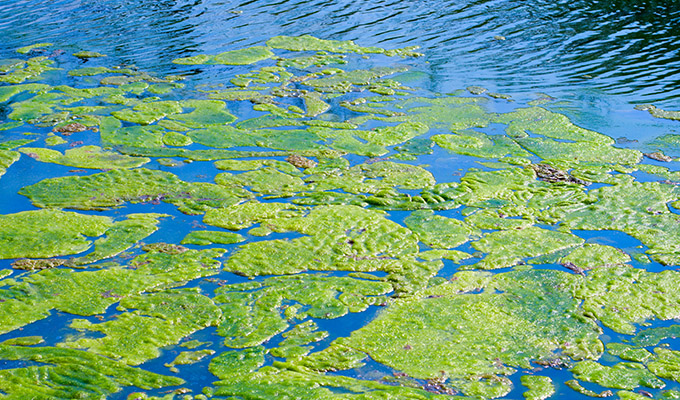When you hear the word “algae” you probably picture an unkempt fish tank or a pond covered in growths of fluffy green plant matter. While algae may look like a plant, it is actually a group of photosynthetic eukaryotic microorganisms belonging to the taxonomical kingdom Protista.
Algae often gets a bad rap, particularly when it starts to grow out of control, but it isn’t all bad. In fact, certain types of algae can be quite beneficial for the human body. Algae is commonly found in dietary supplements for immune health and it can be a valuable source of protein and fiber.
Where you might not expect to find algae is in your skincare products. The truth is algae offers a wide variety of skin-supporting benefits when used correctly. Here’s what you need to know.
The Three Types of Algae
The algae you find in dietary supplements and skincare products is generally marine algae, also known as seaweed. Though seaweed may look like a plant, they aren’t. Like plants, however, marine algae engage in the biological process known as photosynthesis which uses sunlight to synthesize energy from carbon dioxide and water. This process generally involves the green pigment chlorophyll, but marine algae derive its coloration from several other pigments as well.
Here are the three primary color groups of algae:
- Green Algae – Also known as Chlorophyta, green algae are typically found in freshwater environments, though there are marine species as well. This type of algae contains chloroplasts and utilize the process of photosynthesis to obtain energy.
- Red Algae – Rhodophyta or red algae are usually found in tropical marine environments growing on solid surfaces like coral reefs or attached to other types of algae.
- Brown Algae – The largest species of algae, brown algae or Phaeophyta consist primarily of different varieties of kelp and seaweed found in marine environments.
The algae typically found in aquariums is generally blue-green algae or Cyanobacteria which is sometimes considered a form of seaweed. All types of algae lack the root and internal vascular systems seen in plants – neither do they produce seeds or flowers.
How Does Algae Benefit Your Skin?
The natural world is full of substances that can be beneficial for the human body, but some are more surprising than others. It may come as a surprise, for example, that a plant-like organism often viewed as a nuisance could be a superfood for your skin. Algae has become quite popular in skincare, valued for its toning, hydrating, and revitalizing properties.
Here are some of the ways algae can benefit your skin:
- Algae is a strong humectant, much like hyaluronic acid, that can help reduce moisture loss and improve skin hydration.
- Red, green, blue, and brown algae work as natural brighteners, helping to diminish the look of dark spots and hyperpigmentation, even in sensitive skin types.
- Algae contains certain properties which may help reduce inflammation and benefit inflammatory skin conditions.
- Some species of algae offer natural UV protection – they may also contain mycosporine amino acids which work as antioxidants against free radicals.
- Rich in antioxidants and various detoxifying minerals, algae can help gently unclog the pores to reduce issues with acne breakouts.
- On top of its anti-inflammatory benefits, algae helps inhibit enzymes that break down collagen which may help maintain the skin’s suppleness and reduce fine lines and wrinkles.
When it comes to algae in skincare products, manufacturers often make a distinction between micro algae and macro algae. Macro algae is large enough to be seen by the human eye while micro algae can only be seen under a microscope. Both macro and micro algae can be very beneficial for the skin, rich in carbohydrates, protein, lipids, amino acids, and essential minerals.
Where to Find Algae in Yon-Ka Products
Algae is a versatile skincare ingredient that can be used in a wide variety of products. It can be applied topically as a mask or infused in a serum, cream, or spot treatment. It works well on any skin type, though it’s always a good idea to do a test patch when trying a new product to check for reactivity. French skincare brand Yon-Ka Paris uses algae in many of their professional and retail products.
Here are some of the species of algae you’ll find in Yon-Ka products:
- Asparagopsis Armata (Algae) Extract – A form of red algae that helps purify the skin. Find this algae in Yon-Ka cleansers including Gel Nettoyant, Men’s Foam Gel, and Men’s Foam Scrub.
- Ascophyllum Nodosum (Algae) Extract – A form of brown algae that inhibits melanin production, this algae helps brighten dark spots. Find it in Yon-Ka brightening treatments like Essential White Solution Clarte and Glyconight 10% Masque.
- Palmaria Palmata (Algae) Extract – A form of red algae that inhibits the production and distribution of melanin, this algae helps brighten dark spots. Find this patented ingredient in Essential White Correcteur Cible, Excellence Code Crème, Excellence Code Contours, and Excellence Code Masque.
- Fucus Vesiculosus (Bladderwrack Algae) Extract – A brown algae known for its hydrating properties. Find it in Yon-Ka’s Hydra+ Booster.
- Undaria Pinnatifida (Wakame) Extract – A type of brown algae that reactivates the genes and helps redensify skin by stimulating collagen and elastin production. Find this algae in Time Resist Jour and Time Resist Nuit.
To learn more about the benefits of algae and to explore Yon-Ka’s algae-rich skincare products, shop online or stop in to your local Yon-Ka Partner Spa. Receive complimentary shipping when you spend $55 or more and receive a free trial size kit with orders over $75.
